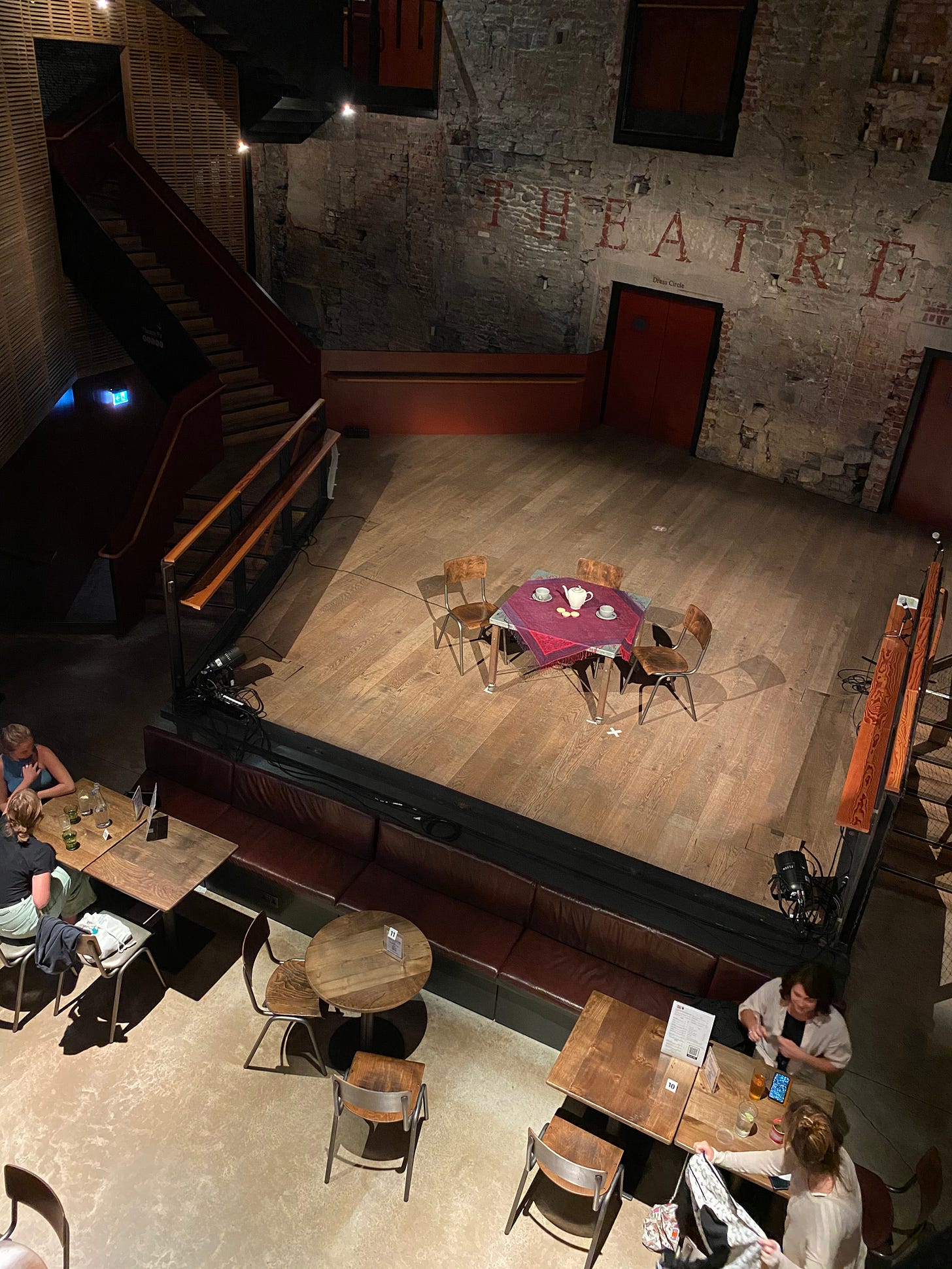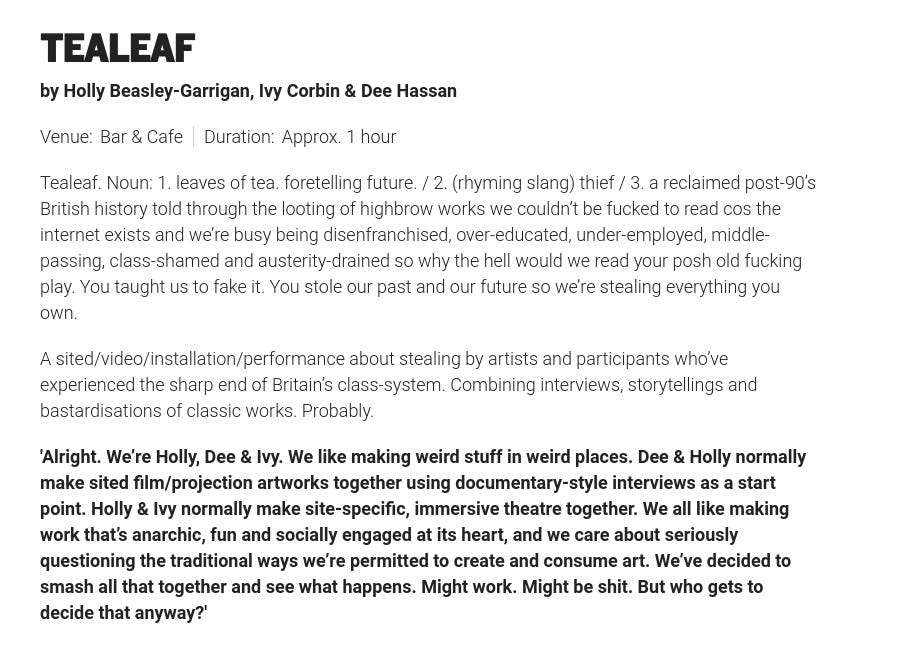At any other time, they might struggle to maintain attention. The show was too loose and too oblique for a space this big. But it had been months - months - since anyone here had been at any kind of live performance. And it would be months, we supposed, till we’d be at any other. So, everyone was rapt. When you’re this hungry, who cares if the food fits the restaurant?
It was a theatre bar: exposed brick and industrial design stretching up to a double height ceiling, in a recently built, expensively modern extension to Bristol’s Old Vic. The show was ‘scratch’ - three young actors sharing some work-in-progress. This was the second Saturday in September, and therefore something like the 25th Saturday since anyone here had been in an audience. We sat cabaret-style, socially distanced, leaning in, separately together, drinking in everything, letting nothing escape.
The event was a gift, but the show was about theft. Tealeaf, it was called. It turned out to be an exploration of how these young people felt about the things - and the sense of belonging - that should be assumed but have been taken from them. Materially, structurally. Things denied them by politics, or by economic forces beyond their control, or by cultural gatekeepers that preside over a failing system while still presuming to decide for them what is of value and what isn’t.
Here’s the blurb:
I’m a middle-aged middle-class white male, so this isn’t my story. It felt like a slap around the face. Young people know, y’know? These actors - young women who describe themselves in air-quotes as millennials and had developed and written the show themselves - were grimly, starkly, sardonically aware of what they’ve inherited. Which is: A post-crash austerity that’s seen their chances for prosperity and social mobility dwindle. An education steeped in narrow forms of expression that feel alien to them and freeze out any artistic vernacular of their own. Little hope in the future.
So while the scratch show was by definition still taking shape, in its conception and reception the evening felt hard-edged. Proof of something. Proof, perhaps, that these frogs can feel the water boil. Proof too that stories will out.
The show was site-specific, meaning they’d developed it for the space in which they performed it, and multi-media, which meant audio recordings and videos projected onto walls. Not so much a play as a series of abstract vignettes, the actors shared their personal stories, took the piss out of the ‘the classics’ and sometimes addressed us directly. The best joke came when they revealed that during the development of this show about theft, they realised that the purest act would be to take the money and run. Your money, they said. And so they walked off, to the piercing, unrelenting sound of a broken transmission, and a huge image of the TV test card.
They left the stage empty just long enough to make us believe they’d really done it. For a moment it felt like The KLF had been reincarnated as three millennial art students.
They showed us theft in its many dimensions. Footage of Thatcher - generational snatcher of milk and something else too, maybe we’d call it hope. Stories of youthful petty shoplifting, normalised by parents of a family struggling in difficult circumstances. A Black actor spoke powerfully about a system that is happy to appropriate her culture but will only celebrate her body when its features are co-opted by white women. Tealeaf got us talking about who is stealing what from whom and when it might be justified - underneath all the stories it was, really, a show about privilege and power. It was allusive, funny and sometimes accusatory, inviting its audience to think about theft as systemic discrimination, but also theft as an individual response to that system.
If the show invited its audience to think about theft, its format made thieves of us. There was no plot, no narrative. “Who cares about dramaturgy, no one even knows what it is,” the actors joked. This is true, but it’s also true that with no clear thread an audience will get to work creating its own. If we’re not handed a story, we’ll invent it - or at least decide what it is. We can’t help it. Our brains are wired to connect experience to knowledge and create meaning from the two. If we didn’t do this the world would feel chaotic and overwhelm us. This is how we make sense of all existence, not just scratch theatre shows. It’s how we create meaning. And it’s a creative act, since it’s the same process we use to generate ideas - we take things that already exist and collide them together in new combinations. Watching Tealeaf felt like doing this in real time. The multiple perspectives and media, the different points in the room, the many dimensions of theft. By leaving a space where the thread might be, we filled the gap and made one for ourselves. From the abstract stimulus and apparently unconnected perspectives, our story-making brains, wilfully or otherwise, were invited to fashion, if not a narrative, then meaning.
Looked at one way, the actors stole that contribution from us, like the theatrical equivalent of the self-service check-out. They made us do the work to save them time and effort. But turn it around and we become the thieves. We took stories that didn’t belong to us and made them our own. We were like magpies, picking around the many sparkling objects strewn around us, the sounds and moving images and tableaux and words, selecting what we wanted and using them in the way that worked for us. In this way, Tealeaf embodied the paradoxical process of exchange that fuels the creative process and our compulsion for storytelling. It was a show about the systemic nature of theft which stole from us so that we might find ourselves in it. It was a show about theft as a legitimate response which forced from us a form of cognitive shoplifting.
Creativity is theft, it said, and theft is a creative act. Genius steals.
I felt energised by the experience. Trying to work out why, I realised it was that I felt at home. This was like a creative review. Leaning in, finding meaning - I enjoy this part of the process. The creatives spinning up loose thoughts and ideas, pinning them to a wall, letting them be for the time being, seeing where the journey takes them. They’re opening themselves up, giving voice to something, the meaning of which may not yet be clear - and it’s my job, at the right points, to do what I did with Tealeaf. Listen out for the points of connection. Spot any underlying themes. Watch a centre of gravity form as the ideas swirl. The physical setting may be a meeting room rather than a theatre bar, but the mental setting is the same. It’s the planner as magpie, instinctively fashioning a narrative from the shiny objects strewn about the room. The planner as scratch show audience, there to elucidate meaning from the ideas on show.
Planners sometimes debate a phenomenon that gets called ‘retro-fitting’ - where the idea comes first and the strategy is built to justify it. I’m not a fan of that particularly, but I don’t think that’s what this is. I think the development of an idea can quite legitimately feel like a dialogue, with the problem and the solution each sharpening the other as they evolve. A creative’s perspective might reframe a planner’s understanding of the problem, just as a planner’s lateral leap opens up hitherto closed routes for the creative. Having an open mind, knowing what can be assimilated and what doesn’t fit, the will to see listening as a creative act - all these should be part of the planner’s skillset. They owe it to the process, and the process is better for it.
The planner asks the question, but the right answer is a matter of judgment, not formula. There’s no x as the equation resolves. And so the planner, I think, is custodian not just of the proposition and the insight, but of a whole world of potential meaning within which the ideas might be set. Doing this means indulging in a little bit of cognitive shoplifting - taking what the creatives have come up with and making it your own. And it means creating the space where the creatives feel they can steal from you - so be prepared to put in a shift at the self-service check-out.
As a Tealeaf audience member, I’d asked no question, and it wasn’t my job, but I found myself doing it anyway. The actors left room for it and in my magpie mind, Tealeaf began to coalesce around a specific idea: the point where millennial life chances intersect with a tightly controlled discourse around art, and where the power of personal stories can be used to amplify and validate young people’s responses to this closed-off world. If it were me, I’d want to develop characters’ stories that dramatise this. I’d think about areas of conflict that would highlight how art mirrors life and vice versa. I’d want an audience to care, to mourn on behalf of this generation. I’d want them to see stories, these young people’s truths, as a way out. As hope.
But it’s not up to me. That’s just a story I’d love to see, or perhaps even tell, but it doesn’t exist. I’ve made up that show in my mind and I have no idea if it’s the show these actors want to make. So I will leave it alone. But as a planner, that kind of leap is my job. To ask, where do these ideas need to go? What meaning do they have? How can they best resonate? How do we make the audience care?
Tealeaf reminded me to embrace my role as a scratch audience more self-consciously. I think good planners do it anyway. Our minds certainly do it anyway, and the planner’s job is to understand the way a narrative grows and to help shape it. It’s a reminder not to be passive. Don’t assume your job is done when you hand over a proposition even if it’s scalpel-sharp. As distasteful and conventional as it sounds, embrace your inner dramaturge. Listen. Adapt. Remember this is a creative process, and therefore a process of exchange - so steal, but also give away. Put your brain to work and tease out the narrative that will make the whole thing stickier for the audience that comes next. The paying audience. The client.



